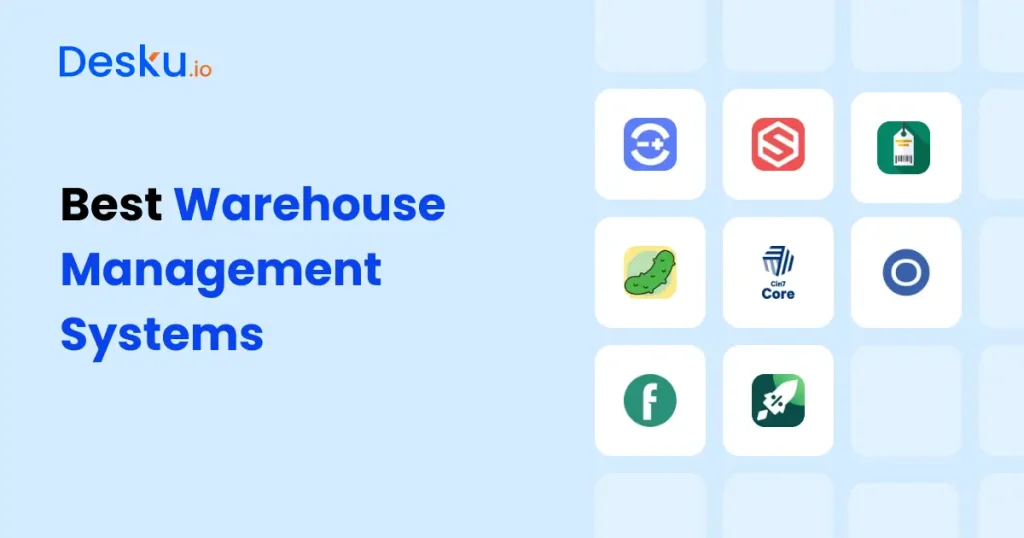Managing warehouse operations can be tricky, especially for Shopify store owners who handle a growing inventory and large volumes of orders. If you’re running an ecommerce store, you need a reliable warehouse management app to streamline your processes. From tracking stock in real-time to automating order fulfillment, the right Shopify warehouse management apps can be a game-changer.
In this post, we’ll explore 8 of the best warehouse management apps for Shopify that can help you manage everything from inventory levels to shipping logistics. Whether you’re a small store looking to expand or a large business in need of better solutions, these apps are designed to simplify warehouse management, boost efficiency, and scale your operations.
The average visitor to a Shopify store spends more than three minutes on the site, visiting at least three different stores. (source)
Why Shopify Warehouse Management Apps Are Crucial
Running an ecommerce business means juggling multiple tasks at once—inventory management, order fulfillment, and customer service, to name a few. As your business grows, keeping track of inventory and ensuring that orders are shipped out correctly and on time can become overwhelming. This is where warehouse management apps come in handy.
What Problems Do They Solve?
Warehouse management apps for Shopify are designed to tackle common challenges such as:
- Inventory Tracking Errors: Manual inventory management often leads to human errors. For instance, a product might show as “in stock” when it’s not, causing delays in fulfillment and potential cancellations.
- Order Fulfillment Delays: As order volumes increase, handling them efficiently becomes harder. The right app can streamline your processes, helping you fulfill orders more quickly and accurately.
- Stockout Situations: Failing to manage your stock levels properly can result in stockouts, meaning lost sales and unhappy customers.
- Inefficient Warehouse Processes: If you manage multiple warehouse locations or products with different storage requirements, things can get complicated. Apps that handle batch picking, barcode scanning, and multi-location inventory can simplify everything.
How These Apps Help
- Automated Inventory Updates: Shopify warehouse management apps sync inventory data in real-time, reducing human errors and ensuring that your stock levels are always accurate.
- Order Prioritization & Fulfillment: These apps allow you to batch orders, making it easier to process orders in bulk, especially during busy times like holiday seasons.
- Streamlined Logistics: Many of these apps integrate with shipping providers, allowing you to streamline shipping labels, tracking, and logistics.
- Multi-Warehouse Support: If you have several warehouses or store inventory at multiple locations, some apps will allow you to manage inventory and orders across all of them seamlessly.
With Shopify warehouse management apps, ecommerce businesses can scale without getting bogged down by manual tasks or costly errors
Top Criteria for Choosing a Shopify Warehouse Management App
When it comes to picking the best warehouse management app for your Shopify store, it’s essential to match the features of the app with the needs of your business. Here are the key factors you should consider to make the right choice:
1. Seamless Integration with Shopify
The app must integrate smoothly with your Shopify store, ensuring real-time syncing of inventory, orders, and shipping information. Any delays or mismatches between the app and Shopify could lead to errors like overselling products that are out of stock or shipping delays. Look for apps that automatically update inventory levels, manage orders, and provide up-to-date information.
2. Order Fulfillment Capabilities
The efficiency of your order fulfillment process can make or break your business. Look for apps that offer features like batch order processing, automated picklists, and barcode scanning for faster, error-free order picking. Some apps can even integrate with third-party logistics (3PL) providers, streamlining your fulfillment process even further.
3. Real-Time Inventory Tracking
Accurate inventory tracking is vital to avoid stockouts or overstock situations. Choose apps that offer real-time updates across all your warehouse locations and channels. Apps like SkuVault and ShipHero excel at this, providing real-time insights into stock levels, replenishment needs, and more
4. Multi-Warehouse Management
If you operate more than one warehouse or ship from multiple locations, your warehouse management app should support multi-warehouse functionality. This allows you to monitor stock levels across locations, assign orders to specific warehouses, and optimize shipping logistics based on the nearest location to the customer.
5. User-Friendly Interface
A clean, intuitive interface is critical for you and your team to navigate the system with ease. The last thing you want is an overly complex dashboard that slows down your operations. Apps like EasyScan and Pickle are designed with user-friendliness in mind, making it easier to train staff and get things done quickly
6. Cost vs. ROI
While price matters, the app’s value in terms of return on investment (ROI) is just as important. Some apps might have a higher upfront cost, but they can save you money in the long run by reducing errors, speeding up fulfillment, or automating manual tasks. For example, Skubana may be on the pricier side but offers robust analytics and efficiency improvements that justify the cost for larger businesses
7. Customer Support
Things can and will go wrong, so reliable customer support is a must. Ensure that the app you choose provides timely support, whether it’s through chat, email, or phone. Some apps may offer extended support hours or even dedicated account managers, which can be invaluable if you run into problems during high-volume periods.
List of the 08 Best Shopify Warehouse Management Apps
1. SkuVault
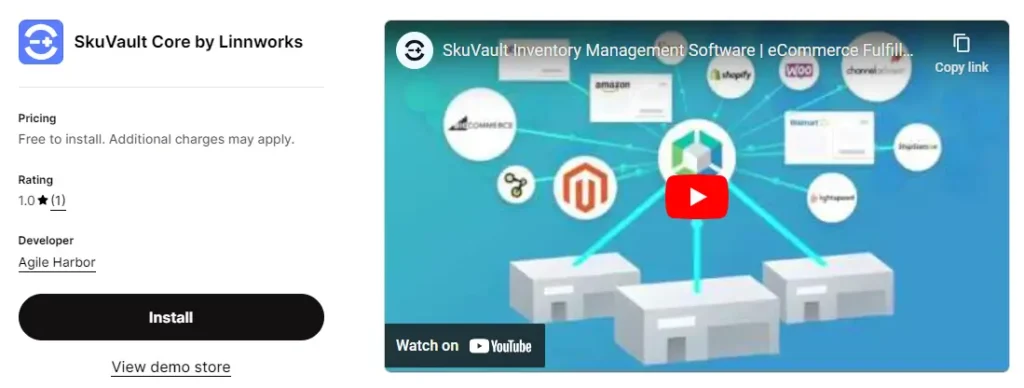
SkuVault is one of the most comprehensive warehouse management systems (WMS) for ecommerce businesses. It is designed to streamline inventory management, prevent stockouts, and integrate with multiple sales channels, making it perfect for Shopify merchants who sell on multiple platforms.
Key Features:
- Real-time inventory tracking across multiple locations.
- Barcode scanning to ensure fast and accurate order fulfillment.
- Integration with major ecommerce platforms, including Shopify, Amazon, and eBay.
- Detailed analytics for stock performance, helping users make informed decisions.
- Multi-warehouse support to manage stock at different locations.
Pros:
- Excellent for large-scale businesses with complex inventory needs.
- Multi-channel integration ensures smooth operations across platforms.
- Comprehensive reporting and analytics.
Cons:
- Expensive, making it less suitable for small businesses.
- Setup and customization can be time-consuming.
Rating: 4.5/5
User Review: Users appreciate SkuVault for its real-time inventory accuracy and seamless integration with other platforms. However, some mention the steep learning curve.
Pricing: Starts at $999/month, custom pricing available
2. ShipHero
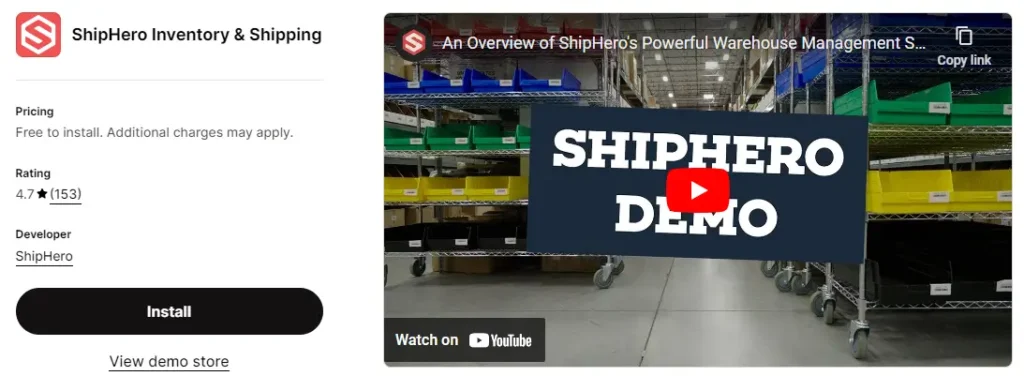
ShipHero is a robust warehouse and fulfillment solution built for Shopify users looking for an all-in-one tool. It focuses on automating processes like order fulfillment and shipping, saving time for ecommerce store owners.
Key Features:
- Real-time inventory updates and syncing.
- Automated picking, packing, and shipping features.
- Integration with major shipping carriers for printing labels.
- Advanced reporting and analytics to track warehouse performance.
- Multi-location support for businesses that operate in several warehouses.
Pros:
- User-friendly interface, making it accessible even for non-technical users.
- Perfect for fast-growing ecommerce businesses.
- Real-time tracking for efficient inventory management.
Cons:
- Pricing may be steep for smaller businesses.
- Limited features for complex inventory management beyond fulfillment.
Rating: 4.7/5
User Review: Users love ShipHero for its ease of use and ability to handle large volumes of orders. They praise its ability to automate fulfillment, though some note the price as a drawback.
Pricing: Starts at $1,850/month
3. EasyScan
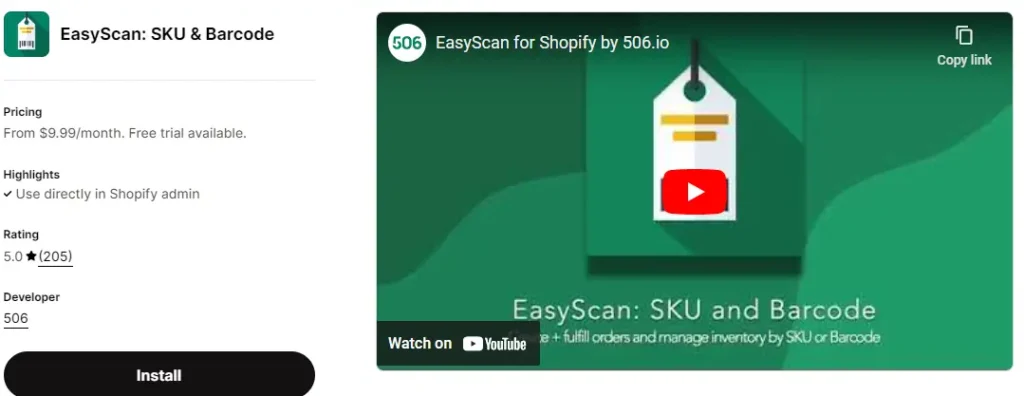
EasyScan simplifies inventory management with barcode scanning, making it easier for Shopify store owners to update stock levels, fulfill orders, and reduce packing errors.
Key Features:
- Create and assign barcodes and SKUs for products.
- Scan barcodes to check inventory and fulfill orders faster.
- Supports inventory tracking across multiple locations.
- Print custom barcode labels and picklists.
- Integrates directly with Shopify for seamless operations.
Pros:
- Easy to set up and start using, ideal for businesses with minimal tech support.
- Affordable, with a 10-day free trial.
- Reduces human error in the fulfillment process.
Cons:
- The basic plan only includes barcode and SKU creation, requiring upgrades for more advanced features.
- Limited customer support availability.
Rating: 4.9/5
User Review: Shopify users rate EasyScan highly for its simplicity and effectiveness in speeding up fulfillment. However, users would like to see more robust support options
Pricing: Starts at $9.99/month, with advanced plans up to $39.99/month
4. Pickle
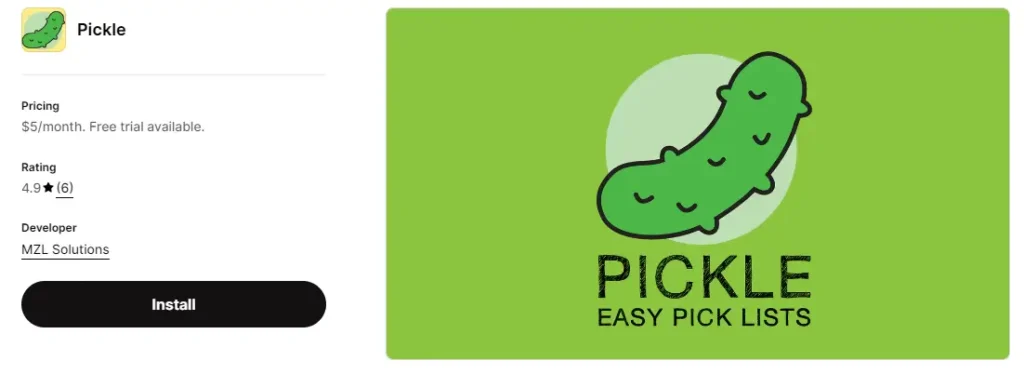
Pickle is designed for smaller Shopify merchants looking to streamline their pick-and-pack process. It’s a user-friendly app that helps ecommerce businesses manage their inventory efficiently.
Key Features:
- Pick and pack orders by location to optimize fulfillment.
- Assign product locations within the warehouse to simplify order retrieval.
- Manage product bundles and kits easily.
- Create downloadable picklists directly from Shopify.
Pros:
- Simple interface that’s easy to navigate.
- Ideal for small-to-medium-sized businesses.
- Very affordable pricing options.
Cons:
- Limited reporting and analytics features.
- Not suitable for large-scale operations with complex needs.
Rating: 4.8/5
User Review: Users appreciate Pickle for its simplicity and ability to help them organize their warehouses, though some larger businesses find it lacking in advanced features.
Pricing: Starts at $5/month
5. Cin7

Cin7 is a powerful inventory management system that integrates with Shopify to offer multi-channel sales support. It’s perfect for businesses that sell on multiple platforms and need real-time stock control.
Key Features:
- Real-time inventory tracking across all sales channels.
- Multi-location warehouse management.
- Automated stock replenishment and order fulfillment.
- Integration with Shopify, Amazon, and other ecommerce platforms.
- Detailed reporting and analytics.
Pros:
- Great for businesses that sell on multiple platforms.
- Powerful automation features for reordering and fulfillment.
- Strong multi-location support.
Cons:
- Higher learning curve, especially for new users.
- Setup can be time-consuming.
Rating: 4.6/5
User Review: Users find Cin7’s integration with multiple platforms a major plus, though some mention that onboarding can take time.
Pricing: Custom pricing based on business size and needs
6. Ongoing WMS
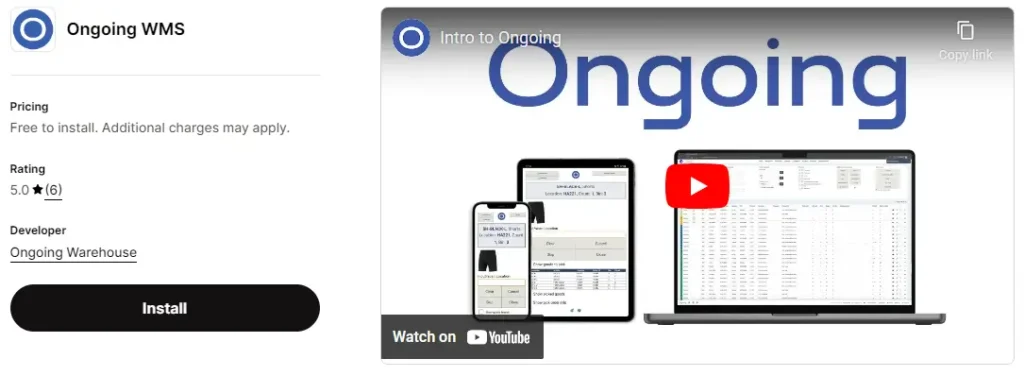
Ongoing WMS is a cloud-based warehouse management solution designed to simplify logistics and improve warehouse operations for Shopify users. It is particularly suited for businesses that manage multiple locations.
Key Features:
- Real-time stock updates for multiple warehouse locations.
- Automated label printing and order batching.
- Supports barcode scanning for picking accuracy.
- Advanced features for managing perishable items (expiry dates, lot numbers).
- Seamless integration with Shopify.
Pros:
- Excellent for businesses with complex logistics and multiple warehouses.
- Tracks serial numbers and expiry dates for better inventory control.
- Easy integration with Shopify.
Cons:
- May be overkill for smaller stores with simple inventory needs.
- Pricing can add up as you scale.
Rating: 4.7/5
User Review: Users appreciate Ongoing WMS for its ability to manage complex logistics, though some mention it can be overwhelming for small businesses.
Pricing: Free to install, custom pricing based on usage
7. Fulfillrite
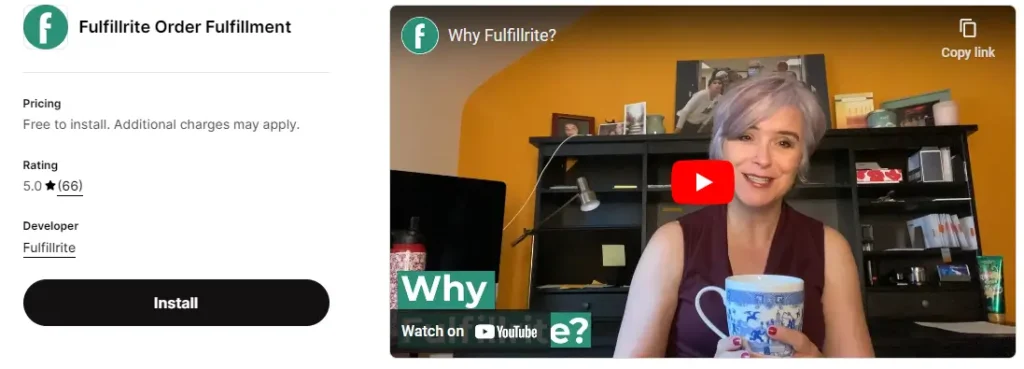
Fulfillrite focuses on simplifying the fulfillment process for ecommerce businesses and crowdfunding campaigns. It automates the entire shipping process, allowing business owners to focus on other tasks while orders are fulfilled quickly and efficiently.
Key Features:
- Automated importing and processing of Shopify orders.
- Real-time tracking for both the business and its customers.
- Same-day shipping for orders received by 2 PM.
- Client portal for managing orders, shipments, and inventory.
- Integration with Shopify and other platforms.
Pros:
- Excellent for businesses looking to streamline fulfillment processes.
- Offers real-time tracking and updates, improving customer experience.
- Same-day shipping ensures orders are processed quickly.
Cons:
- Primarily focused on order fulfillment, with fewer inventory management features.
- May not be ideal for businesses needing advanced warehouse management tools.
Rating: 4.8/5
User Review: Fulfillrite users praise the platform for its quick and reliable shipping, especially during peak times like crowdfunding campaigns. However, some feel that its focus on fulfillment limits its utility as a full-scale warehouse management system.
Pricing: Free to install, pricing varies based on the volume of orders
8. SwiftCount
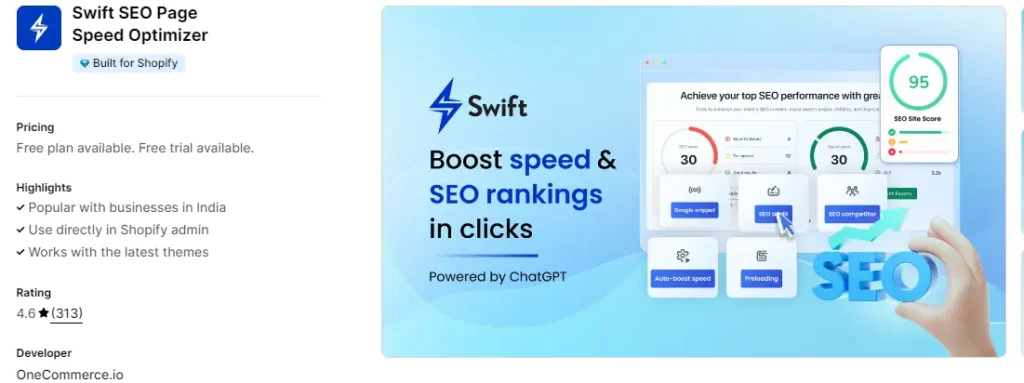
SwiftCount is designed to make warehouse management more efficient, with a focus on real-time inventory tracking and seamless integration with Shopify. It’s especially useful for businesses looking to optimize their pick-and-pack operations.
Key Features:
- Real-time inventory tracking with barcode scanning.
- Supports inventory transfers between multiple warehouse locations.
- Tracks bin locations to speed up the picking process.
- Easy integration with Shopify and other ecommerce platforms.
- Multi-location support to manage stock across different warehouses.
Pros:
- Affordable and accessible for smaller businesses.
- Improves picking and packing efficiency with real-time updates.
- Supports multiple locations and warehouse transfers.
Cons:
- Lacks some advanced features seen in more expensive WMS solutions.
- May not be suitable for businesses with highly complex logistics.
Rating: 4.6/5
User Review: Users appreciate SwiftCount for its affordability and ease of use. It’s particularly praised for streamlining warehouse processes like picking and packing, though some users wish it had more advanced reporting features.
Pricing: Starts at $29.99/month
How to Choose the Right App for Your Business
Now that we’ve gone through some of the best Shopify warehouse management apps, it’s important to understand how to select the right one for your business. Not all apps will suit every type of business, so here’s a step-by-step guide to help you evaluate the best option for your specific needs.
1. Assess the Size and Scale of Your Business
- Small Business or Start-up: If you’re just starting out, you might not need a highly complex system. In this case, opt for simpler and more affordable apps like Pickle or EasyScan, which are ideal for small-scale operations with limited budgets.
- Medium to Large Business: For larger businesses managing multiple warehouses or selling across several platforms, apps like SkuVault or ShipHero would be more appropriate. These apps provide robust inventory management and automation tools necessary for handling high order volumes
2. Consider Your Fulfillment Needs
- Simple Fulfillment: If your main concern is fulfilling orders quickly and accurately, an app like Fulfillrite or SwiftCount may work best. They offer streamlined pick-and-pack processes and real-time tracking.
- Advanced Fulfillment & Multi-location Support: For businesses with complex logistics or those using multiple warehouses, apps like Skubana or Ongoing WMS are great choices due to their multi-location inventory tracking, advanced fulfillment capabilities, and batch processing
3. Evaluate Your Integration Requirements
- Multi-channel Integration: If you’re selling on Shopify along with other platforms like Amazon or eBay, apps like SkuVault or Cin7 offer seamless integrations across multiple sales channels. They ensure you can track all your stock and orders from one place without the risk of overselling
- Logistics Integration: For those who want to integrate with logistics providers, ShipHero or Ongoing WMS are excellent, as they allow direct shipping label creation and integration with major carriers
4. Set a Budget
- Affordable Options: If budget is a concern, start with lower-priced apps like Pickle or EasyScan. These provide essential features without breaking the bank, and you can scale up as your business grows.
- Premium Options: If your business can justify higher costs with complex needs, apps like Skubana or VeraCore offer powerful features at a premium price.
5. Take Advantage of Free Trials
- Most of these apps offer free trials or demos, so take the time to test a few options before making a decision. This will give you firsthand experience and help you understand which app fits your workflow best.
Key Features to Look for in Shopify Warehouse Management Apps
When choosing a Shopify warehouse management app, it’s essential to focus on features that will streamline your operations, reduce errors, and improve overall efficiency. Here are the key features to consider:
1. Real-Time Inventory Tracking
- Importance: Real-time inventory tracking ensures you have accurate stock levels at all times. This prevents stockouts, overselling, and improves order accuracy.
- Look For: Automatic inventory updates synced across multiple sales channels, stock alerts for low inventory, and real-time stock levels across different warehouses
2. Multi-Warehouse Support
- Importance: If you manage inventory across multiple locations, you need a system that helps you track stock in each warehouse efficiently.
- Look For: Features that allow you to assign orders to specific warehouses, transfer stock between locations, and optimize shipping based on warehouse proximity to customers
3. Barcode Scanning
- Importance: Barcode scanning reduces human error during order picking and packing. It also speeds up inventory checks, making operations faster and more accurate.
- Look For: Apps that support barcode creation, printing, and scanning for order fulfillment and inventory management
4. Order Fulfillment Automation
- Importance: Automating your order fulfillment process saves time, reduces errors, and ensures faster deliveries.
- Look For: Features like batch picking, automated shipping label generation, and multi-carrier integration for shipping orders
5. Integration with Shipping Providers
- Importance: Integration with shipping providers helps streamline the process of printing labels, tracking shipments, and choosing the most cost-effective shipping method.
- Look For: Integration with major carriers (e.g., USPS, FedEx, DHL), automatic shipping label printing, and real-time shipment tracking.
6. Custom Reporting and Analytics
- Importance: Having insights into your inventory and order fulfillment process helps you make informed decisions to improve operations.
- Look For: Detailed reports on order volume, product margins, inventory turnover, and performance analytics to help you optimize processes.
FAQs
What is a warehouse management system (WMS)?
A warehouse management system (WMS) is software that helps ecommerce businesses optimize their warehouse operations, from inventory management to order fulfillment. For Shopify store owners, a WMS can track real-time inventory, streamline shipping, and automate workflows, improving overall efficiency and reducing errors
Do I need a warehouse management app if I only have one warehouse?
Yes, even with one warehouse, a management app can help automate many tasks, such as inventory tracking, order picking, and shipping label creation. This will save you time and help avoid errors, especially as your business grows. Apps like EasyScan or Pickle are ideal for smaller operations
How do these apps integrate with Shopify?
Shopify warehouse management apps sync directly with your Shopify store to update inventory, track orders, and manage fulfillment. The integration ensures that product quantities, customer details, and orders are automatically updated in real time, so you don’t have to manually input data
What is the cost range for these apps?
Prices vary depending on the app and its features:
Low-cost options like Pickle and EasyScan start at around $5 to $10/month.
Mid-tier options like SwiftCount or Ongoing WMS range from $29 to $100/month.
High-end apps like SkuVault or ShipHero start at around $999/month or more, depending on the size of your business
Can these apps handle multiple warehouses?
Yes, many of the apps listed, such as SkuVault, Ongoing WMS, and ShipHero, support multi-warehouse management. They allow you to track stock across various locations, assign orders to specific warehouses, and ensure that shipping is optimized based on the customer’s location
Do these apps offer free trials?
Yes, most apps offer free trials so you can test their features before committing. For example, EasyScan offers a 10-day free trial, while many other apps like Skubana and ShipHero provide custom demos
Can I integrate my warehouse management app with shipping carriers?
Absolutely. Many apps, like ShipHero and Fulfillrite, offer integration with major shipping providers such as USPS, FedEx, and DHL. This allows you to print shipping labels, track packages, and select the most cost-effective shipping method directly from the app
Conclusion
Choosing the right warehouse management app for your Shopify store can make a significant difference in the efficiency of your operations. Whether you’re a small business looking for a simple inventory solution or a large-scale operation needing multi-channel support, there’s an app tailored to meet your specific needs.
Key Takeaways:
- Small businesses may benefit from affordable, user-friendly apps like EasyScan or Pickle, which focus on simplifying order fulfillment and inventory checks.
- Larger ecommerce stores with more complex needs should consider apps like SkuVault or ShipHero, which provide robust features like multi-location support, automated fulfillment, and advanced reporting.
- For businesses working with third-party logistics or needing advanced order management, VeraCore or Skubana offer enterprise-level solutions designed to handle high volumes and complex workflows.
By understanding your business’s specific requirements—whether it’s managing inventory across multiple warehouses, integrating with shipping carriers, or automating order fulfillment—you can choose the app that will help you scale efficiently, minimize errors, and improve customer satisfaction.
